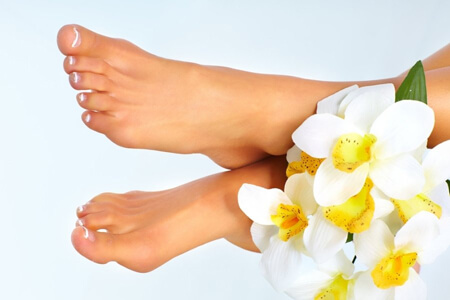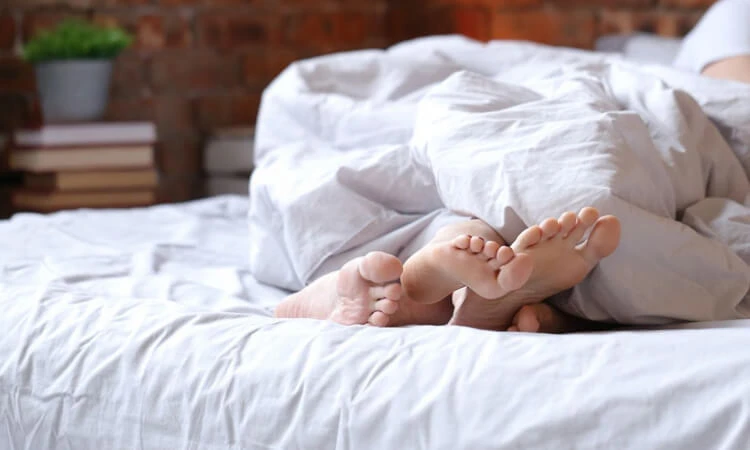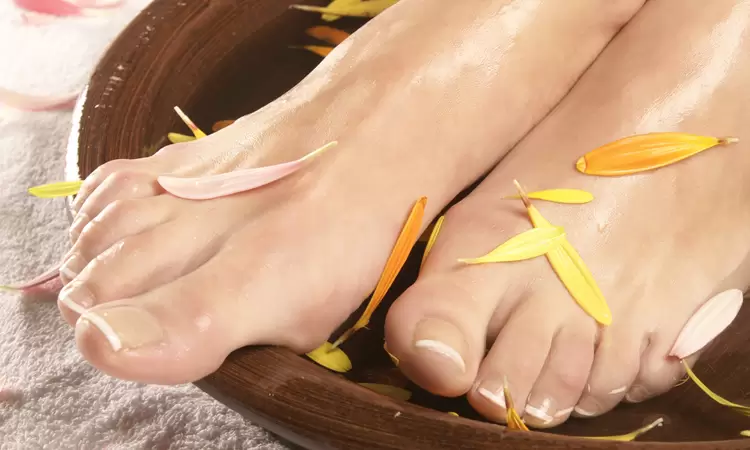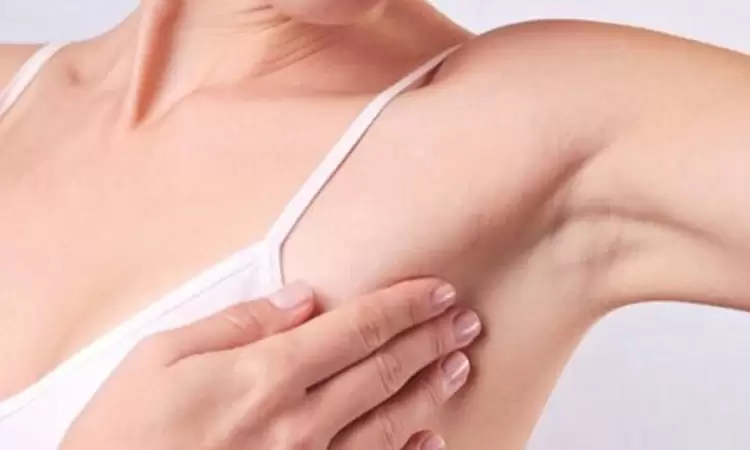- Video: How to Prevent Sweaty Feet | Foot Care
- Personal care
- Video: 7 Natural Effective Remedies For Sweaty Hands And Feet
- Socks
- Video: Quick tip: How to stop foot sweat
- Shoe selection
- Video: How to stop having sweaty and smelly feet naturally
- Folk methods
- Medicated treatments
- Other Treatments for Sweating
- Contact a specialist
- Video: How to Treat Severe Sweating of the Feet with Seattle Podiatrist Larry Huppin
- Rate the author (1)
- Comments (3)
Getting rid of sweaty feet in women can be tricky, but there are a few things you can do to help manage the problem. Here are some of them:
- Use an antiperspirant on your feet. Antiperspirants contain aluminum compounds that block the sweat glands and reduce the amount of sweat your feet produce. Choose antiperspirants that contain aluminum hydrochloride or aluminum zirconium.
- Avoid wearing non-perfumed materials. Socks made from synthetic materials can block air circulation and increase perspiration. The best choice is socks made from natural materials such as cotton or wool.
- Wear shoes made from natural materials. Shoes made from artificial materials can block air circulation and increase sweating. The best choice is genuine leather or suede shoes.
- Wash your feet regularly. Washing your feet regularly helps reduce bacteria and odor associated with perspiration.
- Avoid shoes that are too tight. Shoes that are too tight can block air circulation and increase sweating. It is better to choose shoes that fit well and do not cramp your feet.
- Try using foot powder. Foot powders can help reduce sweat and odor associated with perspiration.
- Consult your doctor. If none of the above help you manage sweaty feet, see your doctor for help. In some cases, sweaty feet may be due to medical problems such as hyperhidrosis or hormonal changes. In such cases, a doctor may recommend treatments to help reduce sweating.

So, best tips to reduce excessive sweating of the feet - further in our article.
Video: How to Prevent Sweaty Feet | Foot Care

Personal care
Personal hygiene can help reduce sweaty feet and prevent bad breath. Here are some tips that might help:
- Wash your feet regularly with soap and water, especially after exercise or sports.
- Dry your feet with a towel to remove excess moisture.
- Avoid wearing non-permeable socks and shoes that do not breathe. Wear socks made from natural materials such as cotton.
- Use antiperspirants on your feet, which can help reduce sweat.
- Use a foot powder that can help absorb moisture and prevent odor.
- If the problem persists, see a doctor who can recommend treatment or prescribe medication.
Remember that personal hygiene is only one aspect of combating sweaty feet. If these methods do not help, more serious treatment may be needed, so do not hesitate to consult a doctor.
Video: 7 Natural Effective Remedies For Sweaty Hands And Feet

Socks
Socks and hosiery can affect the sweating of the feet, as they can create a favorable or unfavorable environment for ventilation and moisture absorption. Here are some tips that can help you choose the right hosiery:
- Avoid synthetic materials such as polyester and nylon. They can block ventilation and retain moisture, which can lead to sweating.
- Wear socks and stockings made from natural materials such as cotton, wool, or bamboo. These materials provide good ventilation and can help wick moisture away.
- Avoid very tight socks and stockings, which can restrict circulation and aggravate sweating.
- Avoid thick textured socks and stockings as they can create additional friction that can lead to sweating and skin irritation.
- Choose socks and stockings with added features, such as built-in antibacterial properties, which can help reduce odor and fight sweat-causing bacteria.
- Don't wear the same pair of socks or stockings all day long. Change them as needed to keep your feet dry and fresh.
I hope these tips will help you choose the right hosiery and reduce sweaty feet.
Video: Quick tip: How to stop foot sweat

Shoe selection
The choice of footwear can also play an important role in reducing sweaty feet. Here are some tips to help you choose the right shoes:
- Avoid shoes made from synthetic materials such as plastic or vinyl, which can block ventilation and retain moisture.
- Wear shoes made from natural materials such as leather or suede. These materials provide good ventilation and can help wick moisture away.
- Avoid very tight shoes that can restrict circulation and aggravate sweating. Shoes should be loose enough to allow the feet to breathe.
- Avoid closed-toed shoes as they can block ventilation and trap moisture. Opt for open-toed or ventilated shoes.
- Avoid wearing shoes without socks as they can irritate the skin and aggravate sweating.
- Wear shoes with removable insoles that can be easily replaced or dried to reduce moisture.
- Don't wear the same pair of shoes all day long. Change your shoes as needed to keep your feet dry and fresh.
I hope these tips will help you choose the right shoes and reduce sweaty feet.
Video: How to stop having sweaty and smelly feet naturally

Folk methods
There are several folk methods that can help reduce excessive sweating of the feet. Some of them include:
- Healing foot baths: Add some baking soda or vinegar to warm bath water and soak your feet for 15-20 minutes. This can help reduce sweating and eliminate bad breath.
- Using Herbs: Various herbs such as tea tree, mint, rosemary, and lavender contain antibacterial and antiseptic properties that can help reduce odor and reduce sweating. You can add a few drops of essential oil to your bath water or use an herbal spray.
- Use of talcum powder: Regular use of talcum powder on the feet can help reduce sweating and reduce odor.
It is important to note that traditional methods may not work for all people, and in some cases may even make things worse. If you suffer from excessive sweating of the feet, it is important to see a doctor for professional advice and treatment.
Medicated treatments
There are several medical treatments for excessive sweating of the feet:
- Antiperspirants: Antiperspirants contain aluminum compounds that block the sweat glands and reduce sweating. There are antiperspirants specifically designed for feet that can be more effective than regular antiperspirants. It is important to follow the instructions for use and do not use antiperspirants on irritated or damaged skin.
- Botox injections: Botox injections can be used to reduce sweating in the legs. Botox blocks the nerve signals that stimulate the sweat glands, resulting in less sweating. However, this method has a temporary effect and requires repeated injections after a few months.
- Medications: Some medications can help reduce sweating. For example, anticholinergic drugs such as glycopyrrolate can block nerve signals that stimulate the sweat glands. However, these medications may have side effects such as dry mouth and eyes.
It is important to see a doctor for advice and treatment if you suffer from excessive sweating of the feet. Your doctor may recommend the most appropriate treatment depending on the cause and severity of your symptoms.
Other Treatments for Sweating
In addition to medical and folk methods, there are other treatments for sweating that can be effective in various cases. Some of them include:
- Surgical treatment: In some cases, when other treatments do not work, surgical treatment, such as endoscopic sympathectomy, may be required. This is a procedure in which the nerves that stimulate the sweat glands are blocked, resulting in a reduction in sweating.
- Intensive physical activity: Regular vigorous physical activity can help reduce sweating by increasing the amount of sweat produced during exercise and decreasing the amount of sweat produced at rest.
- Electrical Stimulation: Electrical stimulation can be used to block nerve signals that stimulate the sweat glands, resulting in less sweating.
- Sweat Patches: Some companies make special patches that can help reduce sweat in specific areas of the body, such as the legs or underarms.
It is important to note that each treatment method has its own advantages and disadvantages, and it is important to consult a doctor for advice and choose the most appropriate treatment method, depending on the individual and the causes of excessive sweating.
Contact a specialist
To solve the problem of excessive sweating of the legs, you can contact a dermatologist or endocrinologist. A dermatologist can help you determine the cause of your excessive sweating and suggest treatments that may include antiperspirants, medications, botulinum toxin treatment, or surgery.
An endocrinologist can help with cases of endocrine system problems that can lead to excessive sweating. In any case, I would recommend that you see your doctor for specific recommendations and treatments depending on your individual circumstances and the causes of excessive sweating.
Video: How to Treat Severe Sweating of the Feet with Seattle Podiatrist Larry Huppin

















Comments (3)
Follow the hygiene of the feet. Wash your feet regularly with soap and water, especially before bed. Dry your feet with a towel and use special foot care products to help reduce sweating.
Avoid hypothermia of the feet. Wear warm socks and shoes during the cold season to avoid cold feet.
Change your lifestyle. Quitting smoking and drinking alcohol, increasing physical activity, and eating a healthy diet can help reduce sweating.
Use deodorants for your feet. There are special foot deodorants that help reduce perspiration and eliminate odor.
Try folk remedies. Some home remedies, such as tinctures of chamomile, licorice, sage, and other herbs, can help reduce sweating and eliminate odor.